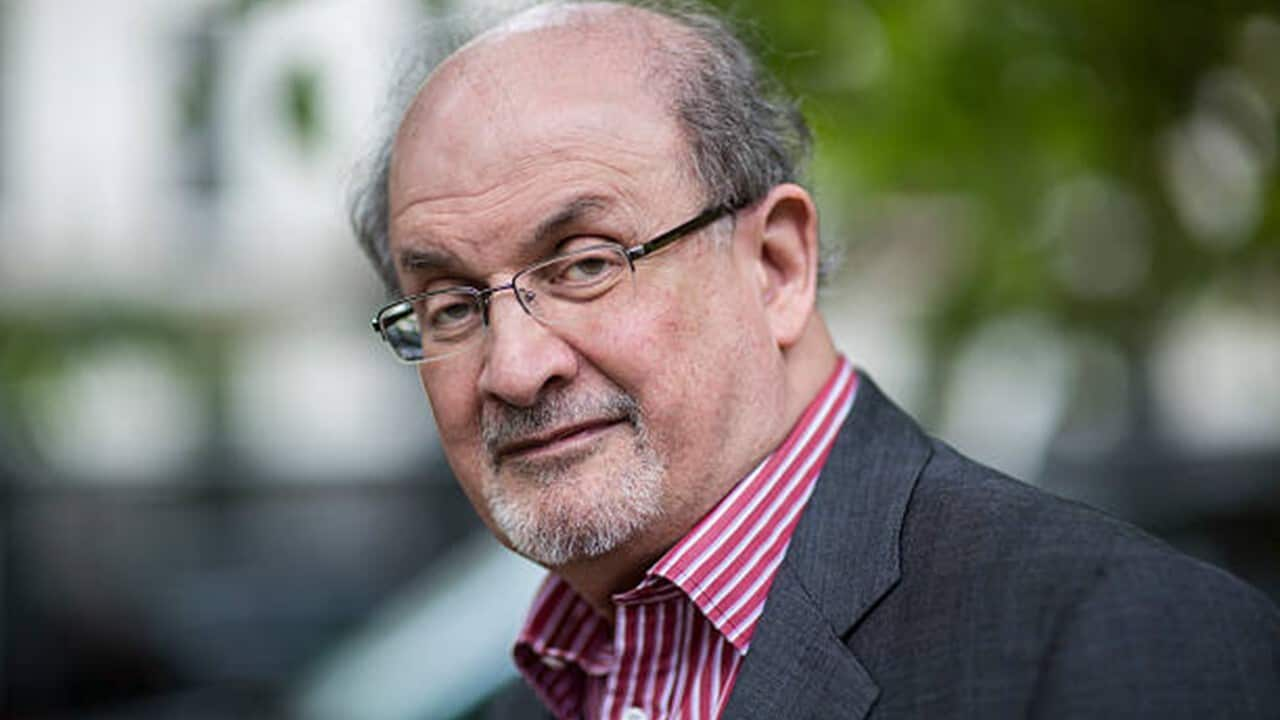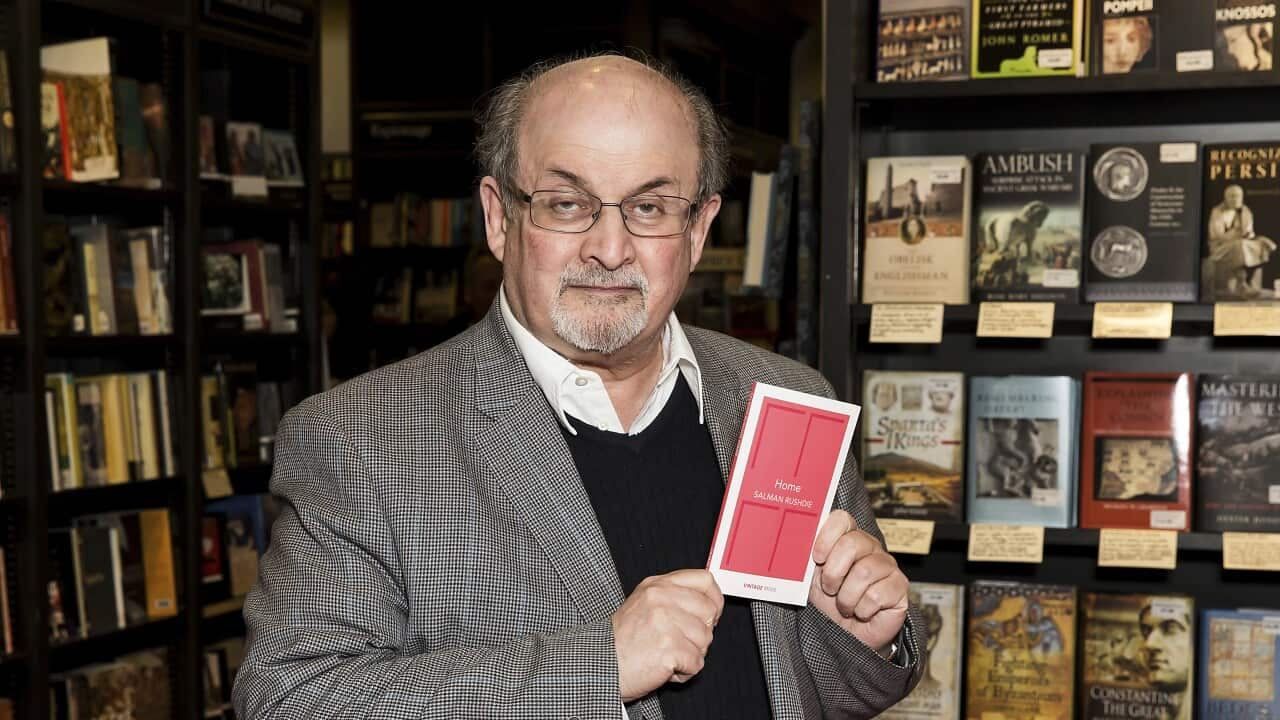Key Points
- The attack on Salman Rushdie coincided with the resumption of negotiations on the Iranian nuclear deal
- It's been 34 years since the novel “Satanic Verses” was published
- There is still concern about the reactions of Muslim communities in the West
The attack on Indian-born, British-American writer, Salman Rushdie, by Hadi Matar, has returned a spotlight to the author's controversial book "The Satanic Verses".
Mr Rushie, 75, was stabbed by Hadi Matar during a cultural event in New York on 12 August.
Opinions on the incident were divided between supporters who welcomed the attack, and those who were concerned about targeting a man defended by the west on the basis of freedom of opinion and expression.
The attack garnered reactions from across the globe, including those who voiced their support for the attacker, and those who condemned it.
Almost 33 years after the uproar over Mr Rushdie's novel "The Satanic Verses" and the fatwa issued against him by the leader of the Iranian revolution, Ayatollah Khomeini, in 1989, the world was surprised by this incident, according to Lebanese journalist and political activist, Qasim Qassir.
The whole world had forgotten the case of Salman Rushdie and after the fatwa, almost 34 years later, no one talks about this anymore.
Mr Qassir told SBS Arabic24 that further investigations were needed to discover whether the attack was personal or orchestrated by third parties.
He said the attack may have been a way to "...draw attention to some direction, especially in the midst of nuclear negotiations with Iran.”
Hadi Matar's mother condemns his actions
Mr Matar's mother told the Daily Mail online newspaper that her American-born son had returned “changed” and more religious from a trip he made in 2018 to Lebanon, his parents' homeland.
Silvana Firdous expressed her sadness at her son's attack on Mr Rushdie, about whom she said she had not known anything before the incident.
She stressed that she did not care about politics and denied knowing anyone in Iran and said that her son alone was “responsible for his actions.”
Mr Qassir added: “Freedom of opinion is required by all, but even in countries that promote democracy, there are still principles and laws in the constitution that don't allow prejudice to certain topics or values.”
“The United Nations issued resolutions against the abuse of religions because what happened to Salman Rushdie or others may not be merely considered an opinion.
"There are actions that are offensive to God, for example the cartoons featured in the French magazine (Charlie Hebdo)."
We must distinguish between freedom of speech and attack on religion
Mr Qassir added: “Therefore, we must distinguish between freedom of speech and attack on religion or abuse of Islamic holy beliefs."
"These are supposed to be dealt with under certain laws in each country so that this pattern of abuse does not spread, which will naturally lead to reactions from those who follow these religions or consider them sacred. This is something that should be regulated.”
Iran categorically denies any relationship to the attacker
Nasser Kanaani, spokesperson for the Iranian Foreign Ministry, denied any involvement of his country in the attack, adding that “...no one has the right to accuse the Islamic Republic of Iran.”
However, in his press conference in Tehran, Mr Kanaani said that “freedom of expression did not justify Mr Rushdie insulting Islam in his writings.”
Mr Kanaani added: “By insulting the holy pillars of Islam and crossing the red lines of more than 1.5 billion Muslims, Salman Rushdie has exposed himself to the wrath and indignation of Muslims.”
According to the Iranian official, Iran had no information about the attacker other than what had already been published in the media.
Mr Qassir says that the Iranian government is keen to calm things down at this stage.
No one in Iran can cancel a fatwa or ruling because it is a final ruling, but they cannot applaud this action. At the same time, they do not want to issue any statement that sabotages the nuclear negotiations.
"He has offended more than a billion Muslims": Australian-Islamic group
In an interview with SBS Arabic24, the President of the Humanitarian Dialogue Foundation in Australia, Kamel Mustafa Al-Kazemi, denounced Mr Rushdie, saying that he had offended 1.5 Muslims around the world and that such abuses “must be deterred.”
He said: “What Rushdie published is not just an opinion. He has offended more than one billion Muslims. Rushdie presented Islam in a way that is very abhorrent and offensive.”
He did not present arguments or an intellectual or even ideological opinion for discussion. Therefore, fatwas were issued.
Mr Al-Kazemi pointed out that a “deterrent” must be put in place in light of the failure to condemn acts that are offensive to Muslims.
“We have seen that there is huge embrace of this person in the west,” he said.
Fears of a resurgence of Islamophobia attacks on Muslims in the west
Writer Ahmed Radi says that freedom of expression in the western world is sacred for writers and authors, but also points out the need to distinguish between freedom of expression and “insulting holy beliefs".
“There are lines that may not be clear between freedom of expression and insulting holy beliefs," Mr Radi said.
"Freedom of expression is guaranteed to everyone. When we came to Australia, we, as Australians, signed contracts respecting freedom of expression as an important Australian value, but what worries me and many intellectuals is the reaction (to the attack),” Mr Radi says.
“The reactions that will occur in America and in Europe may affect us as Muslims living in this country. We have people born here in Australia.”
Mr Radi says some Muslims in Australia and other western countries are worried about a backlash.
“Criticism is often veiled by respecting people's feelings, opinions and beliefs, but Salman Rushdie may have gone beyond the issue of expressing opinions to clearly insulting and provoking, but is violence justified in these matters?" he said.
The US State Department criticises Iran for “bragging” about the attack on Rushdie
US Secretary of State, Anthony Blinken, criticised the Iranian media for “bragging” about the attack on Mr Rushdie, describing such behaviour as “sordid.”
Earlier, he denounced Iranian state institutions for what he called their incitement to violence against the author.

US Secretary of State Antony Blinken criticised the Iranian media for "bragging" about the attack on Salman Rushdie. Source: AAP, Reuters / Reuters Pool/AAP
Iran will submit its “final proposals” on the nuclear deal
Iranian Foreign Minister, Hossein Amir Abdollahian, recently announced that his country will submit its “final proposals” on reviving the nuclear deal to the European Union, days after he presented Tehran and Washington with a “final text” formula after many months of negotiations.





